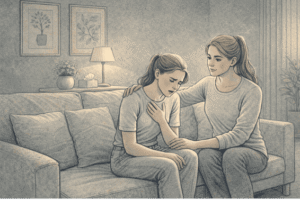Mental Health Resources
Welcome to our mental health resources hub—your one-stop destination for clear, reliable, and compassionate information. Here, you’ll discover educational guides on mental health conditions, treatment options, coping strategies, and support tools for individuals and families. Whether you’re navigating anxiety, depression, trauma, or seeking ways to support a loved one, our goal is to empower you with the knowledge you need for healing and recovery. Start exploring our resources today and take the first step toward better mental wellness.
Explore Our Comprehensive Mental Health Guides
Table of Contents
Get Started
Complete a brief form to receive a prompt call back from a member of our experienced and compassionate admissions staff. All communication is 100% Confidential.
Our Clinical Approach
Explore our unique, result-oriented clinical approach, training partnership with the Beck Institute, treatment methods, and the many ways our approach can benefit you. https://missionconnectionhealthcare.com/mental-health/#
Treatment Locations
Explore our trusted treatment locations designed to provide compassionate, personalized care in a safe and supportive environment.
Paying for Care
Mission Connection is committed to helping you understand treatment costs and explore available financial resources to make treatment accessible and manageable.
Mental Health Guides by Condition
Mental health problems are a diverse set of conditions affecting people’s thoughts, emotions, and behavior. Causes of mental health disorders are complex; they arise from a mix of biological, psychological, and environmental factors. Genetics can increase vulnerability, while trauma, chronic stress, and environmental factors can act as triggers.
Different factors interact in complex ways. For example, life stress may exacerbate a genetic predisposition—causing a mental health condition to manifest unexpectedly. When mental illness risk factors overlap, for example, if someone with a genetic predisposition faces a traumatic event like domestic violence, their vulnerability to mental health disorders multiplies. In other words, the chances of developing a mental health condition increase with exposure to risk factors. Recognizing mental health symptoms is crucial for knowing when to seek help. Common signs of mental illness vary widely from condition to condition, but changes in a person’s ability to perform daily tasks normally are a broad signifier. These mental health guides by condition will help further your understanding of the complexities each condition may present.
Mental Health Treatment Planning
When it comes to mental health, there’s no one-size-fits-all approach; treatment options are diverse and should be carefully selected to suit your unique needs and challenges. Flexible options are available to meet different needs, from outpatient programs to virtual therapy sessions. These mental health resources empower individuals to find the right path to healing without disrupting daily routines.
The first step to an accurate diagnosis of any mental health condition is consulting a healthcare professional like Mission Connection. Once you’ve made contact, you’ll likely be invited to complete a mental health evaluation – this will be used to rule out other health problems. A professional diagnosis is crucial to distinguish between conditions that present similar symptoms, like anxiety and depression, for instance. Without the right diagnosis, you may end up with the wrong solutions, potentially making things worse instead of better. Clinicians typically use a combination of clinical interviews, questionnaires (screening tools), and behavioral assessments to diagnose mental health conditions.
Mental Health Therapy Options
Talk therapy and counseling involve discussing thoughts, emotions, and experiences with a trained therapist or counselor, who provides confidential support and guidance. They’re cornerstones of mental health treatment, offering a safe space to explore challenges and develop coping strategies.
Types of therapy for different needs typically include:
- Cognitive Behavioral Therapy (CBT) focuses on identifying and changing negative thought patterns and behaviors. This approach is commonly used for anxiety and depression.
- Dialectical Behavior Therapy (DBT) aims to help individuals understand and manage negative emotions better. It’s frequently used to treat borderline personality disorder.
- Interpersonal Therapy (IPT) seeks to address relationship challenges and social conflicts that adversely impact well-being.
- Trauma-Focused Therapies like Eye Movement Desensitization and Reprocessing (EMDR), help with processing and healing from past traumas (for example, childhood abuse or distressing events).
Mental Health Treatment Medications
Medication is often an essential part of mental health treatment. The appropriate medication varies depending on the condition and the predominant symptoms. However, common options include:
- Antidepressants for managing depression and anxiety
- Antipsychotics for conditions like schizophrenia
- Mood stabilizers for bipolar disorder
Overall, medications aim to regulate chemicals in the brain that are believed to cause symptoms of mental health conditions, improving daily functioning. It’s important to remember that every treatment plan is personalized. Consulting a healthcare provider ensures the right medication for your unique situation.
Specialized Mental Health Support Networks
Research shows that having a good support network is a protective factor against mental health difficulties. So, talking with friends and curating strong connections with family or support groups is one of the best things you can do for your mental well-being.
Online Mental Health Self-Assessments
Mental health self-assessments are a great starting point for exploring potential concerns. Although they don’t provide a diagnosis and shouldn’t be interpreted as definitive evidence of a mental health condition, they can help you spot symptoms and determine whether to seek professional support.
At Mission Connection, we offer a variety of online self-assessment tools, including screenings for depression, anxiety, and PTSD. If your quiz results indicate a need for further exploration, we strongly advise you to contact one of our mental health clinicians for a more comprehensive evaluation. At Mission Connection, we’re here to support you.
Understanding Your Legal Rights in Mental Healthcare
When seeking mental health treatment, it’s important to know your legal rights. Patients are entitled to receive care that is respectful, confidential, and free from discrimination. These rights include informed consent, access to personal medical records, and the ability to participate in treatment decisions. Knowing your rights empowers you to advocate for yourself or a loved one, ensuring safe and ethical care throughout the mental health journey.
Explore Recent Mental Health Blogs

Feeling overwhelmed by headlines? Explore ways to manage information overload in the news and social media, plus mental health tips and coping strategies.

Learn 5 effective ways to help someone having a panic attack. Learn calming techniques and supportive actions to guide them through anxiety episodes safely.

Ever wondered how the media shapes our understanding of mental health? Learn how news, TV, and social media influence stigma—and 7 ways to challenge it.
